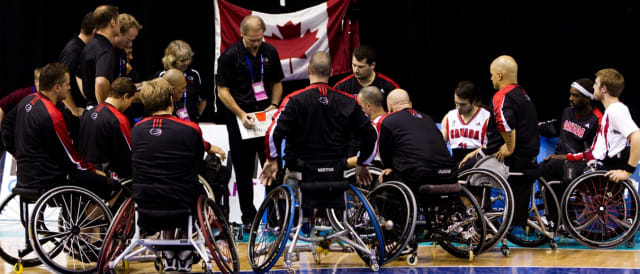Canada loses a tough one
Charlotte (Steve Goldberg's Wheel World) - One of the important aspects of sport is that it teaches us how to deal with loss and move on. Yet even that strength cannot easily assuage the void left when
Charlotte (Steve Goldberg's Wheel World) - One of the important aspects of sport is that it teaches us how to deal with loss and move on. Yet even that strength cannot easily assuage the void left when your coach passes.
Too soon after the loss of NWBA founder Dr Tim Nugent, the wheelchair basketball world mourns again as Jerry Tonello, a fixture in the success of Canada's men's team for two decades passed away this week. He was 59.
Very sad to hear of passing of a special Canadian who loved WC Basketball like few others. https://t.co/UYInIS2bke pic.twitter.com/3uApvlsyNM
— Rob Snoek (@RobSnoekLIVE) January 7, 2016
Tonello stepped away from his head coaching duties last spring as the team was in preparations for the late summer Parapan American Games in Toronto to undergo treatment for a brain tumor.
My heart remains with the team even if I can't physically be there courtside with them during the competition [Toronto 2015 Parapan American Games]. I know how much it means to everyone to show Canadians, and remind the rest of the World, why Canada is the team to beat. - Tonello
At the helm when O' Canada played as the flags were raised in London, Tonello was integral to the red and white's remarkable Paralympic run over the past 20 years. He was the associate head coach of the squad that won silver at the 2008 Beijing Games, and assistant coach of the team that won gold in 2000 in Sydney and finished fifth in 1996 in Atlanta. Canada took gold in Athens 2004. When your objective is gold, silver isn't enough so the best moments for the Canadian team had to be the presence of their coach at Ryerson Arena during the Parapan Am Games.
Deeply moving tribute to coach Jerry Tonello (who is battling a brain tumour) after Canada's 1st win at @TO2015 pic.twitter.com/DzIPFB5J4Q
— Rob Snoek (@RobSnoekLIVE) August 9, 2015
"Jerry was a tremendously well-respected coach," Gaetan Tardif, President of the Canadian Paralympic Committee, said in a statement. "Bringing a work ethic instilled by his parents to his job on the sidelines, he made a remarkable contribution to the national wheelchair basketball program over many years."
The 6ft 2in (1.88m) Tonello was an athlete as well playing many sports growing up including basketball, which he also started playing sitting down. While able-bodied players had been competing in the Canadian Wheelchair Basketball League since 1989, Tonello is recognized as the first able-bodied player to compete in Canada's national wheelchair basketball championships, having done so in 1992.
 Tonello was part of Canada’s national team staff for over two decades.
Tonello was part of Canada’s national team staff for over two decades.
(Photo courtesy of Wheelchair Basketball Canada)
Taking the reins after another Canadian gold rush at the 2008 Beijing Paralympics, he had to steer Canada's men through rough waters, including a seventh-place finish at the 2010 World Championships and a bronze finish at the Guadalajara 2011 Parapan American Games which they had to win to qualify for London. By the end of the 2012 Paralympics though, Canada was back on top.
"The inner champion that was there a few years ago, we may have lost in the four-year cycle, but the inner champion came out and they believed they could do it again," said Tonello at the time. "We have had variable results over the last four years. To be able to put that in the back of their minds and reach a peak performance at this time is incredible."
When he started coaching wheelchair basketball in 1982, eight of the 12 players on Canada's current roster had not been born. Veterans Bo Hedges, who turned 36 last Tuesday, and Adam Lancia who will do the same on January 17th - Happy Birthday guys - were just two years old then. The squad's veteranist of veterans, David Eng, was six.
Somewhere in Canada, a future member of Canada's national team has just or will soon come into the world as the cycle of life continues. He will never know Jerry Tonello but those who tell the stories of what makes the teams wearing the maple leaf special will make sure they know about him.
From me and on behalf of my colleagues who cover the game, our sincere condolences go out to his family and all those who called Jerry Tonello coach or friend.
Steve Goldberg
FIBA
FIBA's columnists write on a wide range of topics relating to basketball that are of interest to them. The opinions they express are their own and in no way reflect those of FIBA.
FIBA takes no responsibility and gives no guarantees, warranties or representations, implied or otherwise, for the content or accuracy of the content and opinion expressed in the above article.
To help make this column as inclusive as possible, please send any national or international event information, story suggestions, or comments to wheelworldmail@gmail.com.